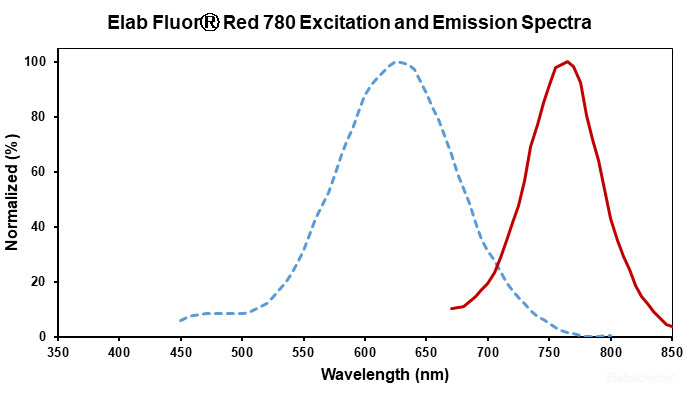Elab Fluor® Red 780 Anti-Human CD3 Antibody[UCHT1]
SKU: E-AB-F1230S-20
To better serve you, we would like to discuss your specific requirement.
Please Contact Us for a quote.
Elab Fluor® Red 780 Anti-Human CD3 Antibody[UCHT1]
| SKU # | E-AB-F1230S |
| Isotype | Mouse IgG1, κ |
| Applications | FCM |
| Host | Mouse |
Product Details
| Form | Liquid |
| Clone No. | UCHT1 |
| Host | Mouse |
| Isotype | Mouse IgG1, κ |
| Isotype Control | Elab Fluor® Red 780 Mouse IgG1, κ Isotype Control[MOPC-21] [Product E-AB-F09792S] |
| Reactivity | Human |
| Application | FCM |
| Storage Buffer | Phosphate buffered solution, pH 7.2, containing 0.09% stabilizer and 1% protein protectant. |
| Recommended Use | Each lot of this antibody is quality control tested by flow cytometric analysis. The amount of the reagent is suggested to be used 5 µL of antibody per test (million cells in 100 µL staining volume or per 100 µL of whole blood). Please check your vial before the experiment. Since applications vary, the appropriate dilutions must be determined for individual use. |
| Shipping | Biological ice pack at 4℃ |
| Stability & Storage | Keep as concentrated solution. Store at 2~8°C and protected from prolonged exposure to light. Do not freeze. Centrifuge before opening to ensure complete recovery of vial contents. This product is guaranteed up to one year from purchase. |
| Conjugation | Elab Fluor® Red 780 |
| Elab Fluor® Red 780 is designed to be excited by the Red (627-640 nm) laser and detected using an optical filter centered near 770 nm (e.g., a 780/60 nm bandpass filter). | |
|
|
|
Fluorophore
Conjugation: Elab Fluor® Red 780
Elab Fluor® Red 780 is designed to be excited by the Red (627-640 nm) laser and detected using an optical filter centered near 770 nm (e.g., a 780/60 nm bandpass filter).
Recommended usage
Each lot of this antibody is quality control tested by flow cytometric analysis. The amount of the reagent is suggested to be used 5 µL of antibody per test (million cells in 100 µL staining volume or per 100 µL of whole blood). Please check your vial before the experiment. Since applications vary, the appropriate dilutions must be determined for
individual use.

![Elab Fluor® Red 780 Anti-Human CD3 Antibody[UCHT1]](http://www.msesupplies.com/cdn/shop/files/Elabscience_2e2a2441-6154-4aa8-a28a-5e196528359d_large.jpg?v=1726813135)
![Elab Fluor® Red 780 Anti-Human CD3 Antibody[UCHT1]](http://www.msesupplies.com/cdn/shop/files/Elabscience_2e2a2441-6154-4aa8-a28a-5e196528359d_compact.jpg?v=1726813135)
![Elab Fluor® Red 780 Anti-Human CD3 Antibody[UCHT1]](http://www.msesupplies.com/cdn/shop/files/E-AB-F1230S_compact.jpg?v=1726813135)
